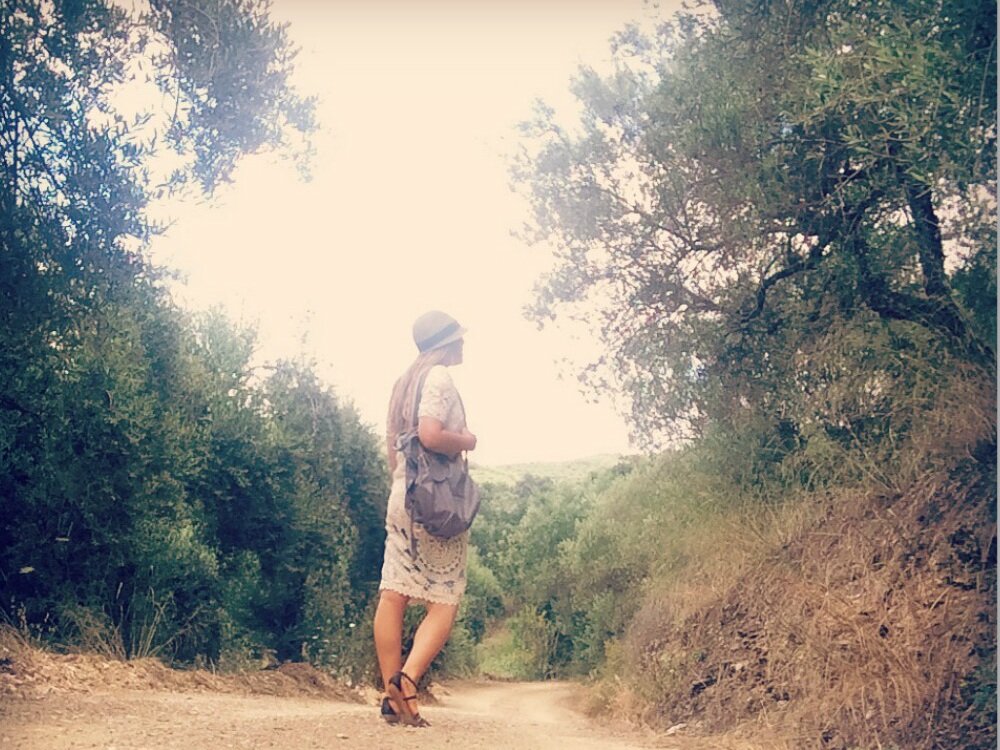After a long flight (and an insane layover in Germany), I have finally arrived in Crete!
I booked a one way ticket and brought way too much stuff for my journey to write a book based on this blog! My goal is to write 10-15 pages a day and also chronicle my life in this tiny, yet incredibly charming village called Avdou. Whenever I travel to a new location my goal is to be immersed in the culture and live like the locals do.
What's the point of traveling if you're just going to stay in a chain hotel and do activities just designed for tourists???
Well, I found the perfect place to explore local culture and discover a slower way of life.
New Meaning of Old
We have long time family friends in this country who graciously rented out a home they have which has been in their family for 150 years!
We have long time family friends in this country who graciously rented out a home they have which has been in their family for 150 years! The home is the perfect example of shabby chic with rustic wood beams, an adorable chandelier, a stone fireplace in the bedroom, a cozy kitchen, beautiful antique wood furniture, and family heirlooms scattered about. The outside is just as charming with a large fig tree perfectly shading the entrance and gorgeous grape vines encircling the upstairs patio.
Pamela and Emmanuel toured me around the home which was also a short lesson in Greek history and a time when life was much more simplistic. The energy of the home is very warming, as you if you feel at home immediately upon opening the door.
As if I wasn't impressed enough, Pamela and Emmanuel provided a large bottle of their homemade olive oil which I'm so excited to use, handmade olive oil soap, and local teas!
Quick Greek Lesson: Olives were discovered (or at least first documented) in Crete around 3000 B.C.E. They have roughly 15 to 35% fat which is in the form of oleic acid.
This is exactly the fat I need to write my book since oleic acid is the primary fat used to form myelin in the brain which helps to relay messages and improve communication.
Greek Mountain Tea
This plant is known for it's antioxidants and essential oils along with phytonutrients like saponins, flavonoids, polyphenols, terpenoids, diterpenoids, triterpenoids, alkaloids, sterols, caffeic acid and quercetin.
Pamela brought 3 Greek teas for me to try, Greek Mountain Tea, Chamomile Tea, and a Tea for Digestion... she clearly knows how much I love herbs. Here's what I have learned about the plants so far!
Greek Mountain Tea pronounced tsah-ee too voo-no is from the leaves and flowers of the Sideritis plant (ironwort) which is found on the rocky slopes at elevations over 3,200 feet. This plant is known for it's antioxidants and essential oils along with phyto-nutrients like saponins, flavonoids, polyphenols, terpenoids, diterpenoids, triterpenoids, alkaloids, sterols, caffeic acid and quercetin. For those of you that haven't taken years of botanical medicine, all those names provide excellent benefits for your health! In total, there are over 60 chemical constituents in ironwort used by traditional doctors in Greece to treat aliments ranging from type 2 diabetes, osteoporosis, seasonal allergies, weight loss, depression, ADHD and even Alzheimer's disease.
Dictamus-Dittany
This took a little research to uncover information about this plant, it's also called burning bush, gas plant, false dittany, and fraxinella. It seems as though there's many uses for this plant internally and externally. the Greeks have used it for centuries to treat constipation, internal parasites, menstrual cramping, to calm the nerves, reduce pain and inflammation, and support liver function. Externally, it's used for a variety of skin conditions including eczema and impetigo. Hippocrates even said "when the wild animals are injured rub the wound them on the plant and it heals quickly". I might try this mixed with a little chamomile this evening to relax into the night.








Every morning since I have arrived in Crete I start the day with Greek coffee and it's amazing! That's quite a compliment coming from a Seattlite, the birthplace of coffee in the U.S. (and Starbucks).
Why is Greek coffee so much better? Well, it's all in the preparation which creates a higher concentration of more protective compounds than your average cup of joe.